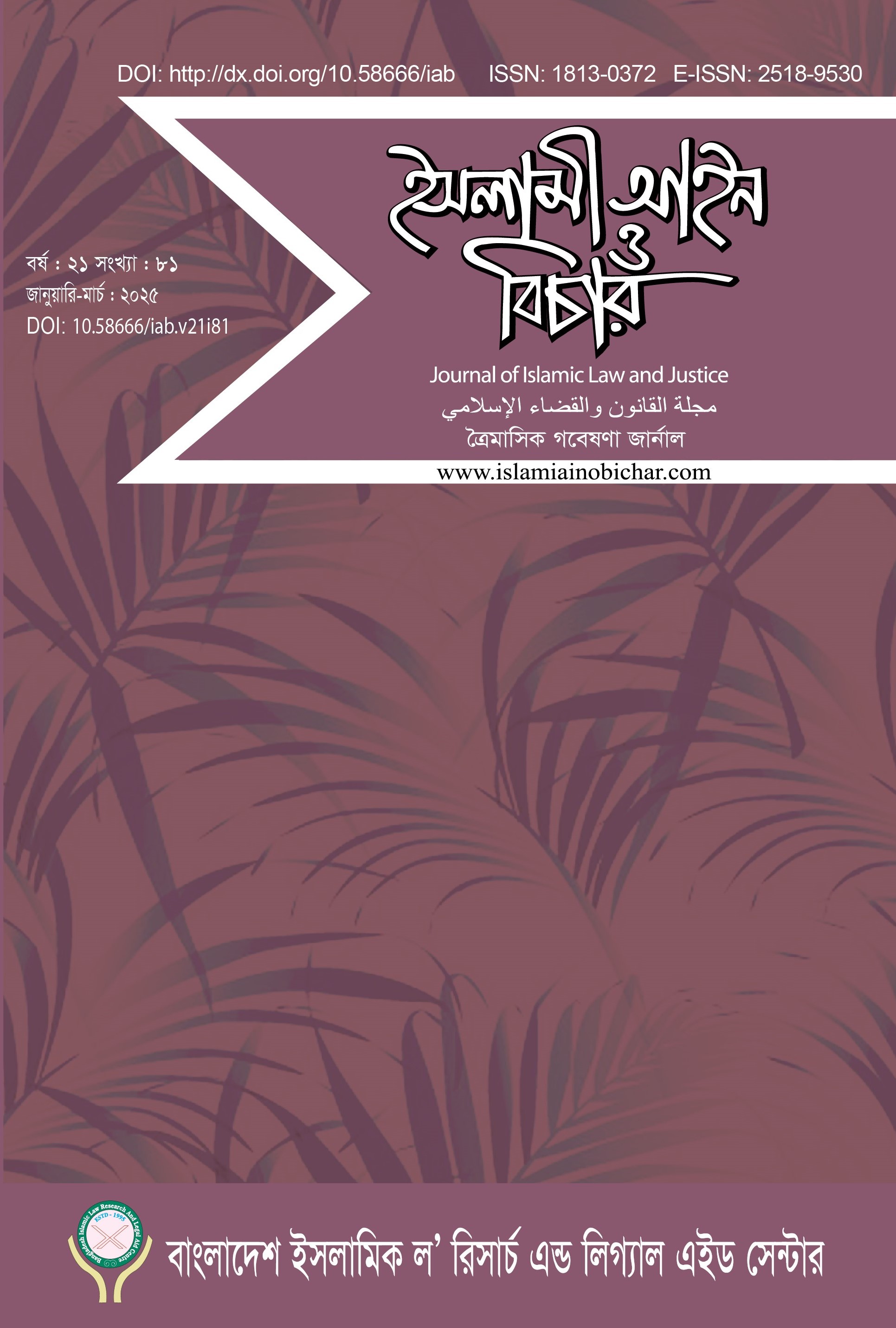ইসলামী আইনে ইসতিসলাহ- এর মর্যাদা ও প্রয়োগ: একটি বিশ্লেষণ|The Status and Application of Istiṣlāḥ in Islamic Law: An Analytical Study
DOI:
https://doi.org/10.58666/iab.v21i81.288Keywords:
Islamic law, Istiṣlāḥ, Maṣlaḥa, Maṣlaḥa Mursalah, Maqāṣid al-Sharīʻah, ইসলামী আইন, ইসতিসলাহ, মাসলাহাহ, মাসলাহাহ মুরসালাহ, মাকাসিদুশ শরীআহAbstract
Islam, as a comprehensive way of life, is grounded in a legal framework derived primarily from four foundational sources: the Qur’an, the Sunnah, consensus, and analogical reasoning. However, in addressing newly emerging and complex socio-legal issues, particularly in light of evolving temporal and societal contexts, Islamic jurisprudence has also employed several complementary sources. Among these, Istiṣlāḥ—a juristic principle based on considerations of public interest—holds a prominent position. The conceptual foundation of istislāḥ can be traced back to the era of the Companions, exemplified by actions such as the compilation of the Qur’an, which prioritized public welfare despite the absence of a direct textual directive. The essential objective of Istiṣlāḥ is to facilitate legal rulings within the framework of the Sharīʿah in circumstances where no explicit guidance exists in the primary sources, yet a solution is necessary to preserve collective well-being. This paper adopts a descriptive and analytical methodology to explore the definition, classification, legal authority, and practical implementation of Istiṣlāḥ. The analysis demonstrates that the judicious application of istislāḥ provides a viable mechanism for ensuring that Islamic law remains both relevant and effective in addressing contemporary challenges. By offering a normative framework through which the higher objectives of the Sharīʿah—namely the promotion of welfare and the prevention of harm—can be preserved, Istislāḥ emerges not merely as a theoretical concept within fiqh, but as a dynamic and principled tool for sustaining the vitality of Islamic legal practice across changing contexts.
সারসংক্ষেপ : ইসলাম একটি পরিপূর্ণ জীবনব্যবস্থা, যার আইনগত ভিত্তি কুরআন, সুন্নাহ, ইজমা ও কিয়াসের ওপর প্রতিষ্ঠিত। তবে সমাজ ও সময়ের পরিবর্তনশীল প্রেক্ষাপটে নতুন ও জটিল সমস্যার সমাধানে এই মূল উৎসগুলোর পাশাপাশি কিছু পরিপূরক উৎসেরও আশ্রয় নেওয়া হয়েছে। এসব পরিপূরক উৎসের মধ্যে অন্যতম গুরুত্বপূর্ণ হলো ইসতিসলাহ বা জনস্বার্থভিত্তিক সিদ্ধান্ত গ্রহণের পদ্ধতি। এর মূল ধারণা সাহাবায়ে কেরামের যুগ থেকেই বিকশিত হয়েছে— যেমন কুরআনের সংকলনের ক্ষেত্রেও জনস্বার্থকে অগ্রাধিকার দেওয়া হয়েছে। ইসতিসলাহর মৌলিক উদ্দেশ্য হলো এমন পরিস্থিতিতে শরীয়তের আলোকে সমাধান প্রদান করা, যেখানে কুরআন, সুন্নাহ বা অন্যান্য মূল উৎসে সরাসরি নির্দেশনা নেই, কিন্তু জনকল্যাণের স্বার্থে সমাধান আবশ্যক। এই প্রবন্ধে বর্ণনামূলক ও বিশ্লেষণধর্মী পদ্ধতি অনুসরণ করে ইসতিসলাহর পরিচয়, প্রকারভেদ, প্রামাণিকতা ও প্রায়োগিক বাস্তবতা- ইত্যাদি তুলে ধরা হয়েছে। প্রবন্ধের মাধ্যমে স্পষ্ট যে, ‘ইসতিসলাহ’ এর সঠিক প্রয়োগের মাধ্যমে ইসলামী আইন চর্চাকে যুগোপযোগী ও বাস্তবমুখী করার যথেষ্ট সুযোগ রয়েছে। কেননা এটি এমন এক তাত্ত্বিক কাঠামো প্রদান করে, যার মাধ্যমে পরিবর্তিত সামাজিক প্রেক্ষাপটেও শরীআহর মৌলিক উদ্দেশ্য—কল্যাণ অর্জন ও অনিষ্ট প্রতিরোধ—অক্ষুণ্ন রাখা সম্ভব হয়। ফলে, ইসতিসলাহ শুধু একটি ফিকহি ধারণাই নয়, বরং তা শরীআহর প্রাণশক্তি রক্ষায় একটি কার্যকর নীতিগত উপায় হিসেবেও বিবেচিত।
References
al-Qur’ān al-Karīm
Abū Dāwūd, Sulaimān Ibn al-Ashʻath al-Sijistānī. ND. Sunan Abī dāwūd. Edited by: Muḥammad Muḥyi al-Dīn ʻAbd al-Ḥamīd. Beirut: al-Maktabah al-ʻAṣriyyah
al-Dārimī, Abū Muḥammad ‘Abd Allāh b. ‘Abd al-Raḥmān b. al-Faḍl b. Bahrām b. ‘Abd al-Ṣamad at-Tamīmī al-Samarqandī. 2000. Sunan al-Dārimī. Edited by : Ḥusayn Salīm Asad ad-Dārānī. KSA: Dār al-Mughnī lin-Nashr wa-t-Tawzī‘
al-Ghazālī, Abū Ḥāmid Muḥammad b. Muḥammad. 1993. al-Mustaṣfā. Edited by: Muḥammad ʻAbd al-Salām ʻAbd al-Shāfī. Beirut: Dār al-Kutub al-ʻIlmiyyah
Ali, Ahmad. 2024. Tulonamulok Fiqh : (Comparative Fiqh). Dhaka: Bangladesh Islamic Law Research and Legal Aid Centre.
al-Juwaynī, ʻAbū al-Maʻālī ʻAbd al-Malik b. ʻAbd Allāh b. Yūsuf b. Muḥammad. 1401H. al-Ghiyāthī : Ghiyāth al-Umam fī al-Tiyāsī al-Ẓulam. Edited by: ʻAbd al-ʻAẓīm al-Dīb. Maktabah Imām al-Ḥaramain
al-Rabīʻah, ʻAbd al-ʻAzīz b. ʻAbd al-Raḥmān b. ʻAlī. 1979. “al-ʻAmal bil Maṣlaḥa” Majallah Aḍwā al-Sharīʻah, (10) 86-184
al-Shanqīṭī, Muḥammad al-Amīn b. Muḥammad al-Mukhtār. 2001. Mudhakkirah fī Uṣūl al-Fiqh. Medina: Maktabah al-ʻUlum wa al-Ḥikam
al-Shāṭibī, Ibrāhīm b. Mūsā b. Muḥammad al-Lakhmī. 1992. al-Iʻtiṣām. KSA: Dār Ibn ʻAffān
- 1997. al-Muwāfaqāt. Edited by: Ibn Ḥasan Ᾱl Slamān. Dār Ibn ʻAffān.
al-Subkī, Tāz al-Dīn ʻAbd al-Wahhāb b. ʻAlī. 1991. al-Ashbāh wa al-Naẓā᾿ir. Edited by: ʻᾹdil Aḥmad ʻAbd al-Mawjūd & ʻAlī Muḥāmmad Muʻawwiḍ. Beirut: Dār al-Kutub al-ʻIlmiyyah
al-Zarkashī, Abū ʻAbd Allāh Badr al-Dīn Muḥammad b. ʻAbd Allāh. 1994. al-Baḥr al-Muḥīṭ fī Uṣūl al-Fiqh. Egypt: Dār al-Kutubī
al-Zarqā, Muṣṭafā Aḥmad. 1988. al-Istiṣlāḥ wa al-Maṣāliḥ al-Mursalah fī al-Sharīʻah al-Islāmiyyah wa Fiqhuhā. Damascus: Dār al-Qalam
al-Zuḥaylī , Muḥammad Muṣṭafā. 2006. al-Wajīz fī Uṣūl al-Fiqh al-Islāmī. Damascus: Dār al-Khair
Fazlur Rahman, M. 2017. al-Muʻjam al-Wāfī. Dhaka: Riyad Prakashani
Ibn ʻAbd al- Salām, Abū Muḥammad ʻIzz al-Dīn ʻAbd al-ʻAzīz. 1991. Qawāʻid al-Aḥkām fī Maṣāliḥ al-Anām. Edited by: Tāhā ʻAbd al-Raūf Saʻad. Cairo: Maktabah al-Kulliyyāt al-Azhariyyah
Ibn al-Hummām, Kamāl al-Dīn Muḥammad b. ʻAbd al-Wāḥid b. ʻAbd al-Ḥamīd. 1351H. al-Taḥrīr fī Uṣūl al-Fiqh. Egypt: Muṣṭafā al-Bāb al-Ḥalabī
Ibn Amīr Ḥājj, Abū ʻAbd Allāh Shams al-Dīn Muḥammad b. Muḥammd. 1983. al-Taqrīr wa al-Taḥbīr. Beirut: Dār al-Kutub al-ʻIlmiyyah
Rahman, Md. Habibur. 2020. Maqasid as-Shariah (The objectives of Islamic Law). Dhaka: Bangladesh Islamic Law Research and Legal Aid Centre.
Ruhul Amin, Md. 2023. Islami Ainer Utsha (Sources Of Islamic Law). Dhaka: Bangladesh Islamic Law Research and Legal Aid Centre.
The Board Of Editors. 2006. Islami Bishwakosh (The Encyclopaedia of Islam in Bengali). Dhaka: Islamic Foundation Bangladesh
Zaydān, ʻAbd al-Karīm. ND. al-Wajīz fī Uṣūl al-Fiqh. Cairo: Muwassasah Qurṭubah
Downloads
Published
Issue
Section
License
Copyright (c) 2025 Muhammad Kamrul Islam kamrul

This work is licensed under a Creative Commons Attribution 4.0 International License.





